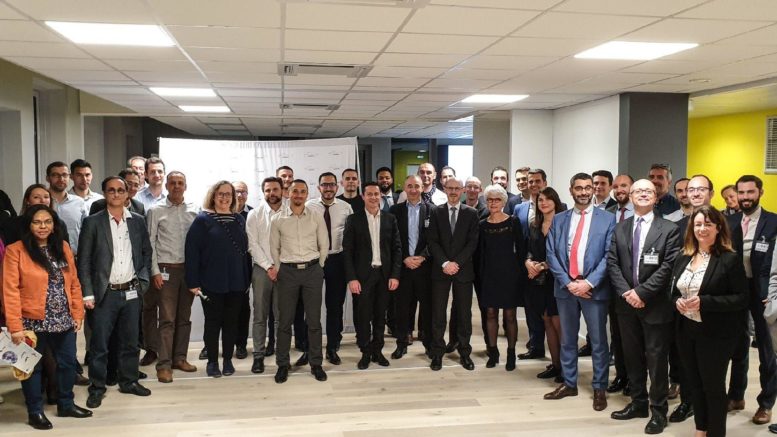The Excellence Club held its sixth evening debate on the theme of innovation and the future challenges of aeronautical MRO in a key location in the Toulouse aerospace ecosystem. Inaugurating the conference room of the B612 of Toulouse Aerospace, representatives and actors of the field evoked with pleasure and curiosity this subject in full mutation, with strategic stakes.
Rossi MRO Solutions, a world class player with complete and customized solutions
The conference opened with the intervention of Matthieu Dupre and Pierre Albert, respectively Director of Commerce & Purchasing, and Quality Director in charge of MRO for Rossi Aéro. Large equipment manufacturer located in Toulouse region, its MRO dedicated branch internalizes all its maintenance operations, and is thus able to answer in a reactive way to the needs of its customers all over the world.
A few key figures were presented: there are currently 20,000 aircraft in service worldwide, with an average operating life of 30 years. If by 2035 nearly 35% of these aircraft are still in operation, 33,000 new aircraft will join the existing fleets of airlines. This means that the aviation maintenance market in the broadest sense will almost double in the next 15 years.
Two main types of maintenance can be distinguished. These are planned maintenance visits (classes A, B, C and D), which are defined by the aircraft manufacturer and correspond to a given number of flight hours, and unscheduled maintenance visits, which follow specific events. It is this last type of maintenance to which Rossi Aero answers particularly.
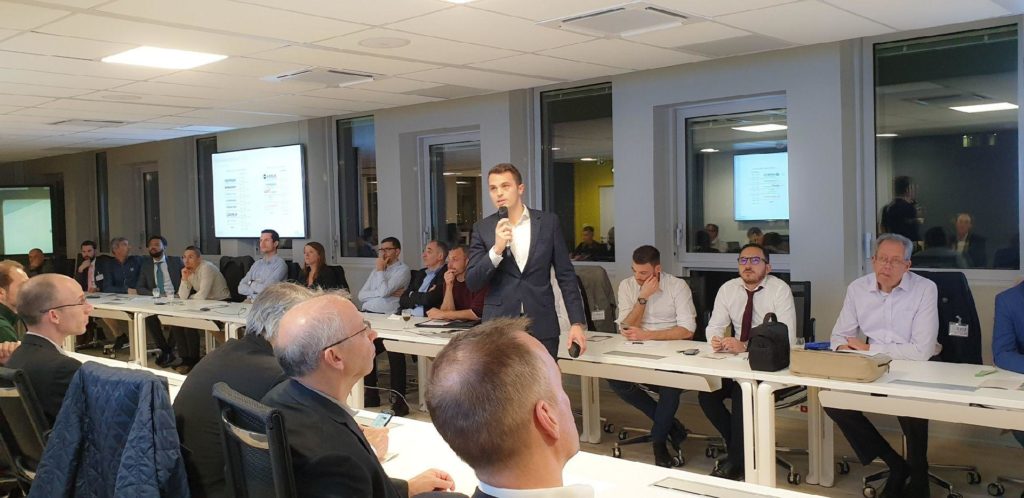
Matthieu Dupre is the Sales & Purchasing Director of Rossi MRO Solutions ©AeroMorning
Indeed, out of 1500 airlines in the world, 1200 have only three aircraft, which means that they often can not address the largest maintenance companies such as Air France Industrie or Sabena Technics. Thus, Rossi Aero positions itself as an actor able to answer the specific and punctual needs of the companies of the whole world, and this whatever they are.
Thus, for a given maintenance need, the company takes charge of recovering the part in question, and of inspecting it, in a visual way and by non-destructive tests. If the part is repairable, then the maintenance workshops act and the company issues a new certificate of airworthiness (PART 145). If the part cannot be repaired, the company will offer to remanufacture it by itself. At any time, the customer is kept informed of the progress of the repair process, and can anticipate his return to ground service (AOG).
The strength of Rossi MRO Solutions lies in its ability to adapt to the specific needs of its customers, through a reactive supply chain, fully internalized repair resources, and a power of delegation with respect to airworthiness organizations.
Sabena Technics and digital transformation for customer and employee satisfaction
The evening continued with a presentation by François Doré, Director of Innovation at Sabena Technics. A French company with international influence, Sabena Technics specializes in MRO and modification services for civil and military aircraft.
The first concept put forward was the company’s reflection on its digital transformation. François Doré emphasized that digital transformation, far from being a simple fashion phenomenon, remains key to enabling European companies to stand out in an increasingly competitive environment. It must contribute to increasing customer satisfaction and their ability to capture new markets.
Digital transformation must also help optimize the operational performance of companies and attract new talent. This last point is crucial: the world of MRO is experiencing a shortage of skilled labor. This is due to the fact that today we are in a manual environment where the level of technological equipment is lower than at home. Digital technology is thus seen as a means of responding to these problems, and would provide the structure necessary for the sustainability of the performance of companies in the sector.
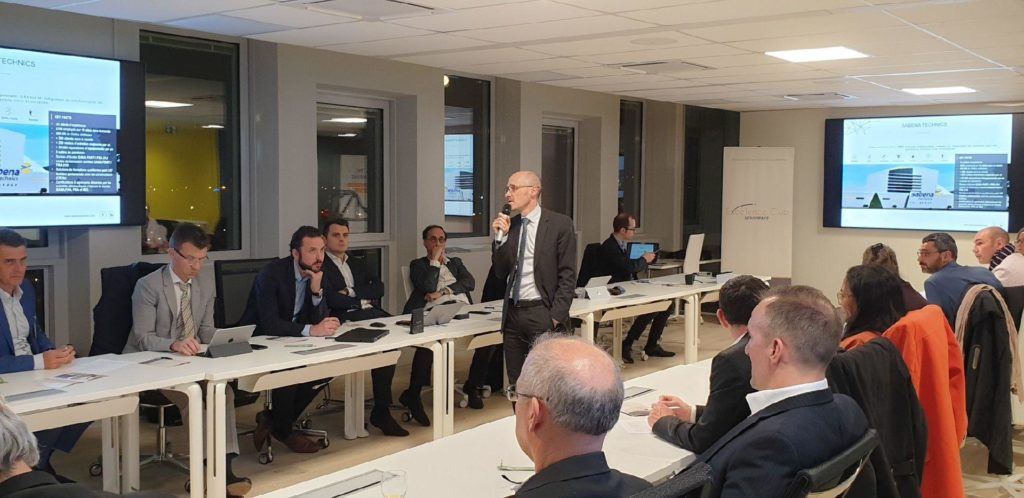
François Doré, Director of Innovation at Sabena Technics, described how his company has carried out its digital transformation ©AeroMorning
To this end, Sabena Technics has deployed a digital component at all levels of its activity, from the recruitment process, to the maintenance workshops, to the connected mechanic. This global digitalization of the workshops had an immediate effect: from one million printed sheets per year, the company went to zero. All maintenance tasks performed by the mechanics are now tracked on mobile touchscreen devices, which enable real-time management of maintenance tasks and unite employees around a “community” inspired by the social networking model. The customer can access a site information portal, validate a schedule, choose a part, and receive a dematerialized visit file.
Thus, by integrating all the players in the maintenance process into a global digital system, equipment downtime and the time required to put it back into service are optimized and anticipated. Today, this networking of players and equipment is continuing, with projects related to the geolocation of tools, virtual reality in the workshop, etc. These advances will enable us to continue developing new business models in line with the concept of predictive maintenance.
These concrete transformations are the result of careful thought: a company’s transformation plan depends on its ability to define its strategy, identify relevant innovation gas pedals (SMEs, new solutions, etc.), and integrate the human element at every stage of the process.
Flight Watching, an innovative SME in the field of flight data analysis
After a short break, the third presentation was led by Jean-Philippe Beaujard, co-founder of Flight Watching. A real start-up six years ago, Flight Watching is now part of the Revima group, a global specialist in aeronautical MRO. The great added value of Flight Watching is its innovative flight data analysis solution, which brings today’s software power to old communication concepts.
Indeed, since the 1970s, all airliners have been communicating autonomously and at regular intervals, status messages of their systems. These messages are intended for their airline’s maintenance centers and airport operations departments. Known as ACARS – Aircraft Communication Addressing and Reporting System – they are particularly useful for optimizing maintenance operations, since, even before the aircraft has landed, the maintenance center already knows in theory which systems to work on.
In practice, these ACARS messages are mainly used by engine manufacturers (10%), while the rest is archived and possibly studied in the event of an accident or long-term study. The whole idea of Flight Watching is based on the revalorization of this concept, with a software solution able to interpret these complex data, and to present them in a clear and oriented way, according to the required application. Thus, an airline can have a digital dashboard of the status of the systems of its entire air fleet, remotely and instantly.
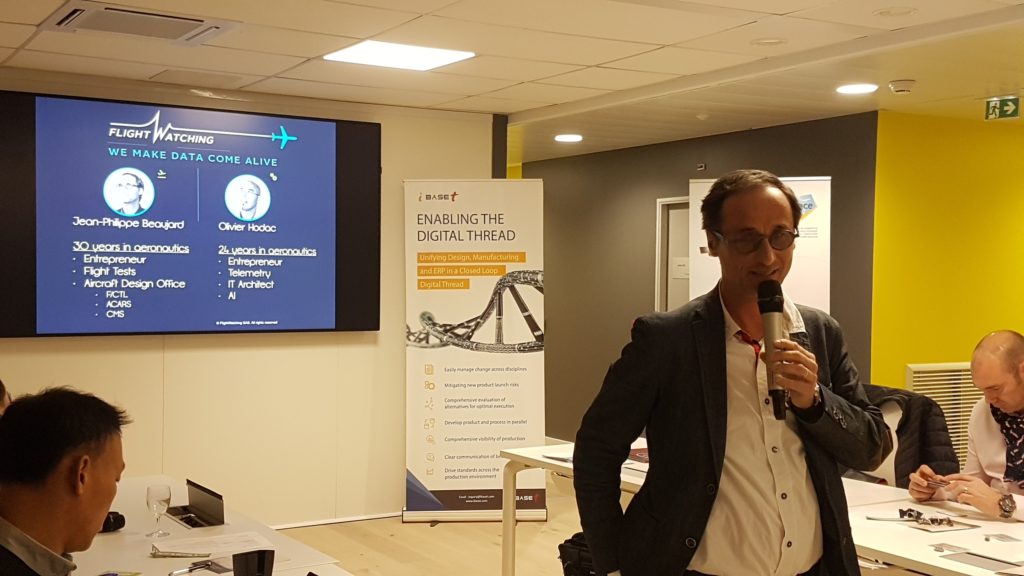
Jean-Philippe Beaujard, co-founder of Flight Watching ©AeroMorning
It is easy to understand the added value of such a device: in case of a system failure during a flight, experts on the ground can look at the data received live, and bring a precious help to the crew in difficulty. In addition, this solution makes predictive maintenance easier, as all data can be classified and extrapolated according to customer needs. This can help experts to detect failure occurrences and predict more appropriate maintenance scenarios.
Thus, the software solution proposed by Flight Watching allows a global and real time overview of all the systems of an aircraft fleet, and to facilitate and anticipate maintenance. Today, the software application also allows to optimize ground operations, by identifying and optimizing the most time-consuming steps prior to a flight (towing, engine start-up…).
Conclusion of the evening with a perspective by a representative of Aerospace Valley
The evening ended with a presentation by David Macheto, director of the Aerospace Valley aeronautics division. Responsible for boosting aeronautical activities in partnership with Liebherr Aerospace, David Macheto offered an enlightened conclusion on the future and the major challenges of the field, highlighted during the previous speeches.
The world of aeronautical MRO has more and more players, and it could be that with digitalization, GAFA-type players that are traditionally distant from the aeronautical sector will find themselves competing with historical players in the field. Thus, to face these eventualities, and to always stay ahead in the field, three key aspects are to be followed today:
Reducing operational maintenance costs: work needs to be done on equipment and aircraft maintenance processes to ensure that they remain easier to repair, with, for example, increased use of certain thermoelastic composite materials. Automation will also be necessary in certain areas to reduce repair times.
Individualization: individualizing maintenance visits (including those planned) for each device will allow for the optimization of resources, and this will be made possible by increased digitalization of the field. The specific needs of each device will be taken into account throughout its life, for each customer. This will increase the availability of equipment, as operators will have a clear view of the specific maintenance program for each of their devices.
Training: the development of new processes (virtual reality, etc.) and their integration at the human level should facilitate the work of qualified personnel and attract new talent.
These aspects will enable companies in the field to remain competitive, while anticipating and meeting the high standards expected by today’s and tomorrow’s air operators. This opening marked the culmination of an evening rich in exchanges and meetings, in an exceptional location.
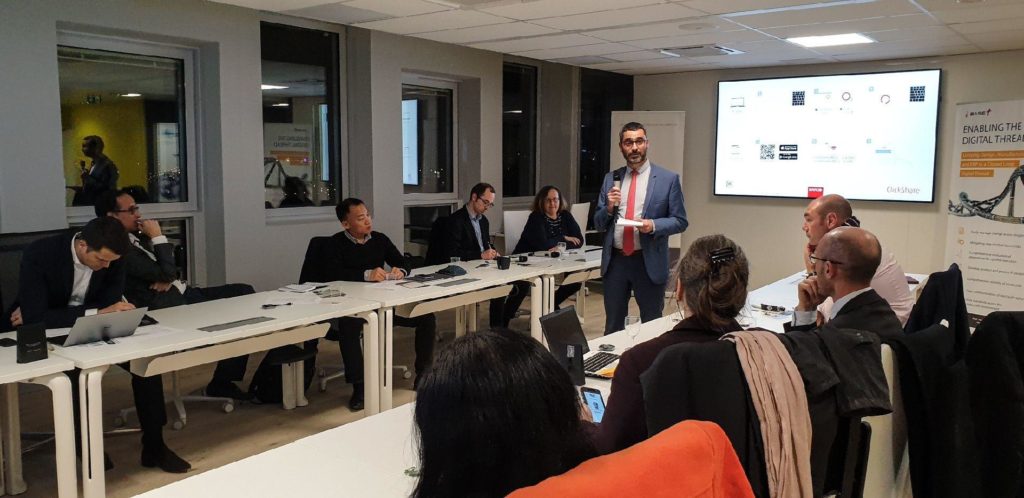
David Macheto, Director of the Aerospace Valley aeronautics division, gave a very enlightened conclusion on the challenges of the MRO sector ©AeroMorning
Vincent FRAMENT

